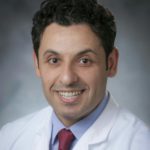As an attendee of the 2017 American Heart Association (AHA) Scientific Sessions in Anaheim- California, I have had a chance to attend one of the most comprehensive scientific sessions on tips for early career physicians. This session was very rich and answered some of the questions that we face as early career cardiologists. Particularly, questions on the optimal path of training for trans-catheter valves, and things we don’t learn in residency. Although clinical practice guidelines remain the primary mechanism for offering evidence-based recommendations, these sessions are intended to provide guidance for clinicians in areas where evidence may be limited. I found the topic of this session to be quite interesting, and I hope all derive as much as I did from these tip sessions that the AHA provides.
Trans-catheter aortic valve replacement (TAVR) and trans-catheter mitral valve replacement (MVR) utilize new and transformational technology for severe aortic stenosis (AS) and significant mitral valve regurgitation respectively, in patients for whom surgery is not an option. As we all know, TAVR and MVR have been increasing in volume over the past several years, but this has not really been matched by corresponding data describing the learning curve for this new technology. This session builds on the recommendations in the 2014 AHA/ACC guideline for the management of patients with valvular heart disease and highlighted the optimal path of training as an important step for the best outcome.
Despite the great success of TAVR, close to 25% of TAVR patients die within 1 year of their procedure, and others survive the intervention but remain with poor overall health status. Training programs are one of the important factors that need to be addressed carefully. To summarize, in my opinion, I think there needs to be further development of this subject, particularly in terms of training and developing new trans catheter centers. Currently there’s no real data-driven guidelines in terms of how people become proficient in this technology, nor is there guidance for training methodologies pertaining to TAVR or trans-catheter MVR. Here are some important points that we need to ask ourselves prior to the start any training:
- Do self-assessment (what are your interests, strength and weakness).
- Have you been taught a problem solving approach?
- Do you need to do 10 cases to feel comfortable with a procedure? 100?
- Ask for candid assessment from your trainers.
- Be careful about taking chances in the first year!
- Can introduce new technologies to practice.
In this context, this session highlighted the importance of developing strategies and partnerships that allow initiation of new TAVR and MVR programs that can produce efficacious and safe results that are comparable to existing national benchmarks. It is my hope that other attendees will take full advantage of all the session offerings such as this one. This conference is, without a doubt by far, the most educational and enriching experience!

Dr. Fawaz Abdulaziz M Alenezi is a post-doctorate associate at the Duke University Health Systems. He conducts medical research on the derivation and validation of novel echocardiographic approaches to myocardial deformation and a new echocardiographic technique which assists patients with heart ventricular function.